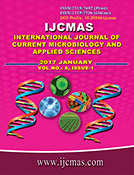


 National Academy of Agricultural Sciences (NAAS)
National Academy of Agricultural Sciences (NAAS)

|
PRINT ISSN : 2319-7692
Online ISSN : 2319-7706 Issues : 12 per year Publisher : Excellent Publishers Email : editorijcmas@gmail.com / submit@ijcmas.com Editor-in-chief: Dr.M.Prakash Index Copernicus ICV 2018: 95.39 NAAS RATING 2020: 5.38 |
Phosphorous is one of the most abundant metallic element found in the earth’s crust and present in soils in both organic and inorganic forms. Though it is present in high concentration, only 0.1% of the total P is available to plant because of poor solubility and its fixation in soil with other metallic elements in the soil such as Ca, Al, Fe to form calcium phosphate, aluminu phosphate and ferrous phosphate and thus becomes unavailable tmo plants. Tremendous application of chemical based P fertilizers has long term impact on the environment in terms of eutrophication, soil fertility depletion, carbon footprint this attitude compelled us to find a sustainable approach for efficient P availability in agriculture to meet the over growing demand of food. The use of efficient PSM (phosphate-solubilizing microorganisms), opens up a new horizon for better crop productivity and for greater yield performance without affecting the soil health. Phosphate solubilizing microorganism plays an important role in the plant nutrition through increase in P uptake by the plants and their use as PGPR is an important contribution to biofertilization of agricultural crops. Though some of the bacterial strain such as (Pseudomonads and bacilli) and fungal strains (Aspergillus and Penicillium) have been identified as PSM their relative performance under in situ conditions is not reliable and therefore there is a need of genetically modified strains which could lead better P solubilizition and improve the plant health. The present review mostly focuses on the phosphate plant interaction, PSM, mechanism of P solubilization, PSM as plant growth promoter and genetic manipulation of several genes involved in mineral and phosphate P solubilization.
 |
 |
 |
 |
 |